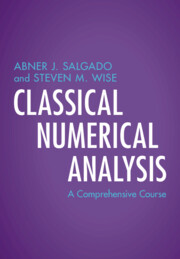Book contents
- Frontmatter
- Contents
- Preface
- Acknowledgements
- Symbols
- Part I Numerical Linear Algebra
- Part II Constructive Approximation Theory
- Part III Nonlinear Equations and Optimization
- Part IV Initial Value Problems for Ordinary Differential Equations
- Part V Boundary and Initial Boundary Value Problems
- 23 Boundary and Initial Boundary Value Problems for Partial Differential Equations
- 24 Finite Difference Methods for Elliptic Problems
- 25 Finite Element Methods for Elliptic Problems
- 26 Spectral and Pseudo-Spectral Methods for Periodic Elliptic Equations
- 27 Collocation Methods for Elliptic Equations
- 28 Finite Difference Methods for Parabolic Problems
- 29 Finite Difference Methods for Hyperbolic Problems
- Appendix A Linear Algebra Review
- Appendix B Basic Analysis Review
- Appendix C Banach Fixed Point Theorem
- Appendix D A (Petting) Zoo of Function Spaces
- References
- Index
25 - Finite Element Methods for Elliptic Problems
from Part V - Boundary and Initial Boundary Value Problems
Published online by Cambridge University Press: 29 September 2022
- Frontmatter
- Contents
- Preface
- Acknowledgements
- Symbols
- Part I Numerical Linear Algebra
- Part II Constructive Approximation Theory
- Part III Nonlinear Equations and Optimization
- Part IV Initial Value Problems for Ordinary Differential Equations
- Part V Boundary and Initial Boundary Value Problems
- 23 Boundary and Initial Boundary Value Problems for Partial Differential Equations
- 24 Finite Difference Methods for Elliptic Problems
- 25 Finite Element Methods for Elliptic Problems
- 26 Spectral and Pseudo-Spectral Methods for Periodic Elliptic Equations
- 27 Collocation Methods for Elliptic Equations
- 28 Finite Difference Methods for Parabolic Problems
- 29 Finite Difference Methods for Hyperbolic Problems
- Appendix A Linear Algebra Review
- Appendix B Basic Analysis Review
- Appendix C Banach Fixed Point Theorem
- Appendix D A (Petting) Zoo of Function Spaces
- References
- Index
Summary
This chapter is devoted to the study of finite element methods in one and two dimensions. We begin by presenting the general theory of Galerkin methods and their analysis; in particular Galerkin orthogonality and Cea’s lemma are introduced in an abstract setting. Then the construction of finite element spaces, and their bases, in one dimension is detailed. The notions of mesh and hat basis functions are introduced here. The general theory of Galerkin approximations is then used to reduced the error analysis of finite element schemes to a question in approximation theory. The properties of the Lagrange interpolant in Sobolev spaces (in one dimension) then close the argument. Duality techniques, i.e. Nitsche’s trick are then used to obtain optimal error estimates in L2. The same ideas are presented, mostly without proof, for the finite element scheme in two dimensions.
Keywords
- Type
- Chapter
- Information
- Classical Numerical AnalysisA Comprehensive Course, pp. 700 - 720Publisher: Cambridge University PressPrint publication year: 2022

